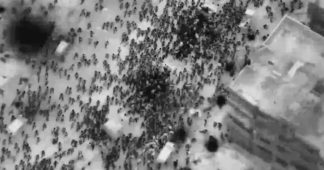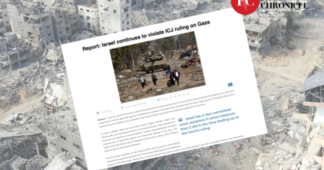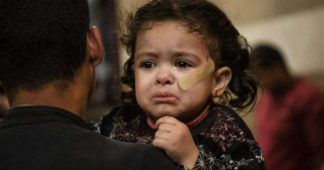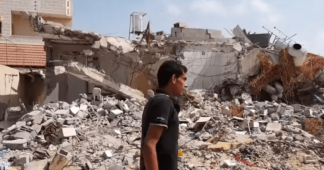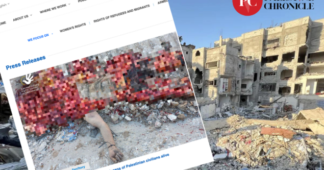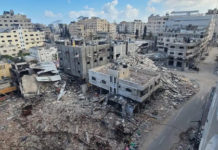Apr. 4 2024
The report titled “Killing starving Palestinians and targeting aid trucks: A deliberate Israeli policy to reinforce famine in the Gaza Strip,” documents incidents between January 11 and March 23, 2024.
A new report by the Geneva-based Euro-Med Human Rights Monitor reveals the killing of 563 Palestinians and the injury of 1,523 others due to Israel’s targeting of people waiting for aid, distribution centers, and workers responsible for organizing, protecting, and distributing aid.
Released on Wednesday, the report titled “Killing starving Palestinians and targeting aid trucks: A deliberate Israeli policy to reinforce famine in the Gaza Strip,” documents incidents between January 11 and March 23, 2024.
During that period, Euro-Med Monitor documented that 256 people were killed in the Kuwait Roundabout area, in the southeast of Gaza City, 230 on Al-Rashid Street, in the southwest of the city, and 21 due to the targeting of aid distribution centers.
Documentation also shows that 41 police officers and People’s Protection Committee members who were in charge of overseeing aid distribution were killed, along with 12 aid distribution workers, two of whom were from the UN Agency for Palestine Refugees, UNRWA.
“Evidence suggests that Israel intentionally perpetrates these crimes, including direct military attacks on humanitarian aid and civilians, as part of a deliberate and overarching policy,” the report stated. “This is evident from the systematic pattern and regular, almost daily recurrence of Israel’s commission of these crimes, as well as the high number of victims affected by them.”
Flour Massacres
Euro-Med Monitor said “one of the most dangerous forms of unlawful killings and executions carried out by the Israeli army” against Palestinian civilians recently is “the systematic targeting of civilian gatherings around humanitarian aid trucks with direct gunfire, quadcopters, and Israeli tank shells, especially on the Kuwait and Nabulsi roundabouts in the south of Gaza City, which have been dubbed the ‘Flour Massacres’.”
The report lists the various incidents of “starving civilians waiting for humanitarian aid” being targeted by Israeli forces, as follows:
On March 23, 2024, 30 Palestinians were killed, and 80 others injured after the Israeli army opened fire at those waiting for aid trucks near the Kuwait Roundabout on Salah al-Din Road, south of Gaza City.
On March 14, 2024, Israeli army forces opened heavy fire on thousands of civilians who had gathered near the Kuwait Roundabout on the Salah al-Din Road in southern Gaza City, using tanks, helicopters, and drones. The shooting left more than 80 dead and 200 injured, with a number of them left in critical condition.
The next morning, Israeli army forces opened fire on residents who returned to the scene in an attempt to retrieve the bodies of the victims. Many of the bodies had been left on the ground overnight, as Israeli gunfire had made it difficult for them to be transferred.
On March 13, six Palestinians were killed, and others injured, while waiting for aid supplies to arrive at the Kuwait Roundabout, on the outskirts of Gaza City.
On March 11,2024, nine Palestinians were killed, and others were injured after Israeli army forces opened fire at those waiting for aid trucks at the Kuwait Roundabout, southeast of Gaza City.
On March 9, 2024, at least two Palestinians were killed and 18 others were injured when Israeli army forces targeted crowds of people waiting for aid at the Kuwait and Nabulsi roundabouts in Gaza City.
On March 4, 2024, Israeli army forces opened fire on crowds of civilians waiting for aid supplies at the Nabulsi Roundabout, southwest of Gaza City.
On March 3, 2024, several people were killed and injured after being shot while waiting for aid supplies at the Kuwait Roundabout in Gaza City.
On March 2, 2024, one Palestinian was killed and more than 20 others were injured after being targeted while waiting for aid supplies at Al-Rashid Street in Gaza City.
On February 29, 2024, 118 people were killed, and 760 others were injured on Al-Rashid Street, south of Gaza City while waiting for aid supplies.
On ebruary 25, 2024, 10 Palestinians were killed, and 20 others were injured after being targeted by Israeli army forces while waiting for aid trucks near the Nabulsi Roundabout on Al-Rashid Street, in the southwest of Gaza City.
On February 7, 2024, five citizens were killed and several others were injured when the Israeli army targeted a group of people who were waiting for humanitarian aid trucks at the Kuwait Roundabout, in the west of Gaza City.
On February 4, 2024, the Israeli army opened fire on a group of people waiting for humanitarian aid trucks near the Kuwait Roundabout.
On January 30, 2024, Palestinian civilians were reportedly shot and injured at the Kuwait Roundabout in Gaza City while trying to receive humanitarian aid.
On January 25, 2024, 20 Palestinians were killed by Israeli forces, and about 150 others were injured, with many of them left in critical condition. The victims were transferred to Al-Shifa Hospital and Al-Ahli Hospital after the Israeli army opened fire on a group of Palestinians waiting for aid trucks at the Kuwait Roundabout in Gaza City.
On January 22, 2024, the Israeli army fired artillery shells at hundreds of hungry civilians who had gathered on Salah al-Din Road, southeast of Gaza City, waiting for UN aid trucks, killing six people and wounding several others.
On January 11 2024, the Israeli army killed approximately 50 Palestinians and wounded dozens of others when quadcopter aircraft opened fire on Palestinian crowds who had gathered to receive quantities of flour loaded by UN trucks on Al-Rashid Street, in the west of Gaza City.
‘Starvation as a Weapon’
Euro-Med Monitor said it is evident from all the incidents documented that “the Israeli army intentionally uses starvation as a weapon of war against civilians in Gaza City and its northern areas.”
“This not only includes the blocking of aid entry into these areas but also the killing and injuring of civilians as they attempted to receive aid supplies, indicating a clear attempt to force residents to evacuate towards the central and southern regions of the Gaza Strip, as part of Israel’s ongoing genocide against the people of the Strip,” the report stated.
The rights body said, “Evidence that surfaced during Euro-Med Human Rights Monitor’s initial investigations into the Flour Massacre at Nabulsi Roundabout on February 29 “confirmed full Israeli involvement in the crime.”
“Many victims of the massacre suffered injuries from 5.56x45mm NATO bullets; this is a type of bullet fired from Israeli army weapons,” the report said. “A sample of 200 dead and injured victims revealed that they were indeed hit by this type of bullet, which was discovered and examined at the massacre site along with shrapnel found in the bodies of the wounded and dead.”
Witness Accounts
The document cites numerous accounts of victims of Israel’s aggression, such as Bahaad Ziad Zidan Krezm of the Jabalia Camp, 23, one of the Palestinians injured near the Kuwait roundabout on March 14.
Israeli forces opened heavy fire on thousands of Palestinians who had gathered at the roundabout on Salah al-Din Street in southern Gaza.
“All I wanted was a bag of flour to feed the 24 members of my family and the displaced people living in our home,” he told the Euro-Med Monitor.
“Ahead of the Kuwait Roundabout, we arrived at a point where we waited for the aid to arrive. Shelling and gunfire erupted from all sides as we approached.”
Krezm added, “We saw people falling in front of us as a result of the intense gunfire coming from quadcopters and the nearby vehicles. Despite the gunfire, I persisted in trying to get a bag of flour, and I did.”
He continued “I immediately turned around, but before I could get back up, I was shot in the back and fell to the ground. I was transported to Kamal Adwan Hospital. Unfortunately, I did not receive a bag of flour, and my family is still hungry.”
The shooting left more than 80 dead and 200 injured, with a number of them left in critical condition. The next morning, Israeli army forces opened fire on residents who returned to the scene in an attempt to retrieve the bodies of the victims.
Many of the bodies had been left on the ground overnight, as Israeli gunfire had made it difficult for them to be transferred, the report said.
Detailed Components of Report
The 24-page report is divided into seven parts: The first deals with the number of humanitarian aid convoy victims, while the second reviews the most prominent crimes involving the targeting of starving civilians waiting for humanitarian aid.
The third examines the Israeli targeting of humanitarian aid distribution centers, while the fourth sheds light on crimes related to targeting humanitarian aid convoys.
The fifth deals with the targeting of workers distributing humanitarian aid, the sixth sheds light on the targeting of those responsible for securing and protecting humanitarian aid, and the seventh deals with Israel’s attempts to evade responsibility for the massacres.
The report also presents a set of conclusions and recommendations.
Euro-Med Monitor said the report “demands the opening of an independent investigation into the killing of starving people, especially the horrifying massacres which Israel has tried to evade responsibility for.”
We remind our readers that publication of articles on our site does not mean that we agree with what is written. Our policy is to publish anything which we consider of interest, so as to assist our readers in forming their opinions. Sometimes we even publish articles with which we totally disagree, since we believe it is important for our readers to be informed on as wide a spectrum of views as possible.
